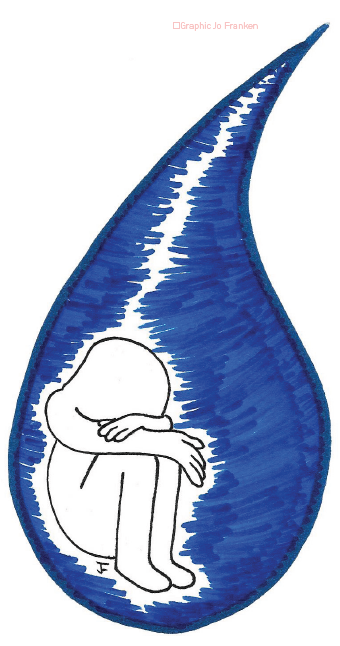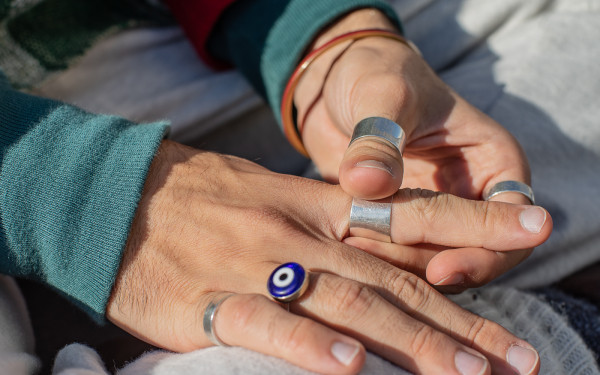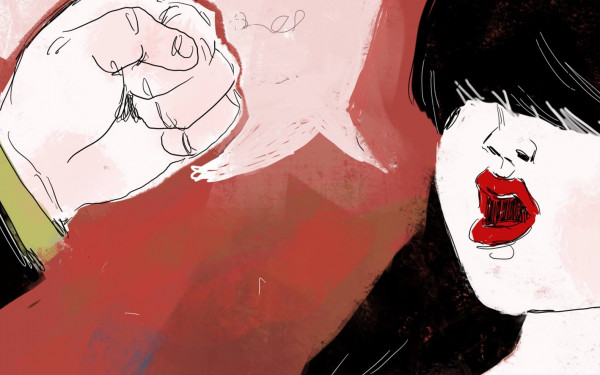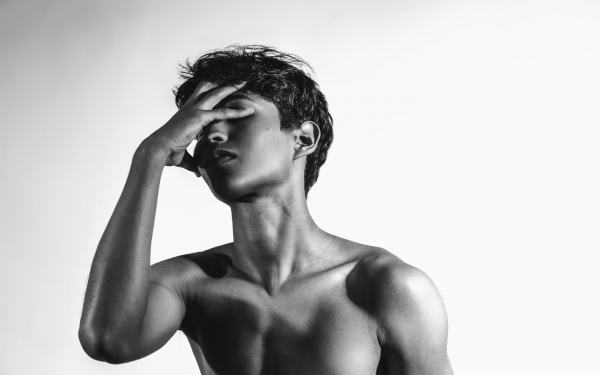Why Don’t Men Cry?
Was The Cure Right?
In an iconic tune by The Cure, Robert Smith sang, “I try to laugh about it/hiding the tears in my eyes/cause boys don’t cry.”
It’s been proven that releasing emotions by crying reduces emotional stress—stress that could eventually lead to cardiovascular disease, among other disorders, if not released.
One of the main functions of crying is to reduce tension and to quicken recovery from distress. It’s also a powerful way to communicate pain and distress to others, says an article on crying during adolescence published in the British Journal of Developmental Psychology.
But if you’re a man, you’ll often find you have a hard time crying. The British Journal of Developmental Psychology shows that as boys grow older, they tend to cry less.
An experiment was conducted with 216 boys and 265 girls, aged 11 to 16, who completed questionnaires on crying frequency, proneness, and empathy. Adolescent boys scored higher than girls on only one question: I feel shame when I cry.
The study also showed that high levels of empathy correlate with more crying, even though men with higher levels of empathy still tend to cry less than women who are just as empathetic. Regardless of heightened emotions, adolescent boys still cry less, suggesting a more social cause to the phenomenon.
The findings transcend cultures. A study in 35 countries in the Americas, Europe, Asia, and Africa found that women are just more likely to cry.
According to Concordia psychology professor, Dr. Michael Conway, men have a hard time expressing emotion because of the way we socialize boys and girls.
“When it comes to emotions it tends to be done differently,” he said. “Boys are discouraged to feel emotions like sadness and fear so they’re less likely to be comfortable with those feelings which might make it harder for them to express it.”
Marc Lafrance, an associate professor in the Department of Sociology and Anthropology at Concordia University, said this is the case because men are expected to live up to an ideal of masculinity.
Lafrance said that in our society men are discouraged from showing all forms of emotion, including pleasure and joy.
“Men who are expressive are mocked and seen as effeminate,” he said. “Even with positive emotions men should keep their composure, never be too happy or too sad. Maintain this perfectly neutral emotional disposition at all times.”
He also says that men are even more discouraged to express their own pain, whether that pain be physical or mental.
Professor of psychology at Concordia, Dr. William Bukowski, defines masculinity as a type of instrumental competence that includes being achievement oriented, self-reliant, and ambitious. Masculine people tend to value competition and tend to place focus on themselves more than others.
Professor of Irish Diaspora Studies, Dr. Jane McGaughey, looked at the definition of “manliness” from the 1800s until World War I, which lay the ground for masculinity today. She explains that “manly men” have to be stoic. They can feel emotion, but not show it to others. Not feeling emotion is considered a failing for men, because you need to be able to show your humanity. These expectations contradict each other.
“For a lot of men in the Victorian time period, the only thing that they could show affection for was their dog,” she said, laughing.
“For a lot of men in the Victorian time period, the only thing that they could show affection for was their dog,” said Dr. Jane McGaughey.
Manliness also includes taking up a lot of space and being dominating, as well as being in total control of themselves and their environment. These stereotypes apply most to men in Canada, the United States, England, and Ireland, said McGaughey.
Bukowski believes that talks of masculinity should be expressed in terms of how it affects femininity as well. He describes femininity as having to do with heightened sensitivity for others. People who are feminine tend to be more invested in their relationships with others, and tend to place a higher value on other’s needs rather than their own. Caring for others, loyalty, and an attuned sensitivity to the needs of others would be all stereotypical feminine traits.
He claims masculinity and femininity aren’t opposites, since people can be hyper-masculine and hyper-feminine at the same time; an androgynous individual. Someone with high masculinity, and low femininity tend to have lower levels of attachment to other people. As a result they tend to be less emotional.
“It’s not masculinity itself per se that is the issue,” he said. “Instead, it is masculinity in conjunction with low femininity. You can be hyper-masculine and very much inclined to express or engage in crying if it’s the case that you’re also high in femininity. But I don’t want to say that people who cry a lot are necessarily high in femininity.”
Lafrance claims that a difficulty to express emotions negatively impacts relationships. Since often men can’t express how they feel, their partners are likely to feel they can’t have a complete and fulfilling relationships.
There are very few settings where men can express their emotions, says Bukowski and Lafrance. Men are socially permitted to cry at events like funerals, but even then they need to be very controlled, and not act out for too long.
These pressures start in the household Lafrance said. There are strong cues that come from both parents and siblings on how one should react to difficult situations.
“Often they’re very subtle and banal, but they teach men either directly or indirectly that manifesting emotion is a bad idea,” he said.
These can come from being told on a routine basis to just pull yourself together. There are also explicit commands that make clear that boys “don’t do stuff like this.”
Even if parents don’t discourage their sons from showing emotion, they still have a whole society that tells them that if they don’t find a way to keep their emotions under wrap, they will be socially penalized.
“They will be penalized by being ostracized from groups of friends, to being singled out by macho teachers,” said Lafrance. “There are all sorts of ways our society punishes boys for not being stoic, emotionless people we would want them to be, apparently.”
However, according to Bukowski, Lafrance, and Conway, claiming that all men have a hard time crying and that women don’t is a gross generalization. There’s a lot of variability. Some women can’t cry, some men can, and vice-versa. That being said, many men relate to the struggle.
Acting coach Liz Valdez says she hasn’t found a divide between her students who identify as male or female—they both have a hard time expressing emotion in front of each other, as we live in a society where you are not allowed to do that. In her classes, she gets students to do exercises to help them access their emotions.
“I find that my male students jump at the opportunity to do that sometimes more than my female students,” she said. “It’s because they’re given permission, a safe space to play different roles, and they get to access parts of themselves that they might not be able to in their everyday life.”
She gets her students to do breathing and sound exercises, and the exercises allow them to open up and cry on command.
“I don’t know how many times I’ve done simple breathing exercises or deep humming [to try] to open all the resonators in the body and I have students crying,” she said. “They’re lying on the floor, eyes closed, and they’re just breathing and all of a sudden they start to cry because they’re releasing something profound that is connected to their voice.”
She claims that the minute you open up that channel, you’re opening up the pathway to expressing emotion. You’re not deciding which emotion that is; you’re just letting it happen.
Lafrance thinks that “it’s not that men don’t want to change, but a lot of them don’t know where to start.”
The Centre de ressources pour homme de Montréal is an organization in the Plateau for men who need help and support. They offer services like psychosocial follow-ups, group intervention, one-on-one therapy as well as support groups where men can share their feelings and vent about difficult experiences on a weekly basis.
It’s a safe space where everyone present can offer advice and support to one another, regardless of the issues someone is facing. The group, led by a therapist or trained counsellor, also encourages people to form long-lasting relationships, and develop a support system.
“Any man who feels like he has a hard time with life can ask for support at our organization,” said the general manager of the centre, Serge Fortin. “Men aren’t taught to take care of themselves by themselves.”
He said that men feel it’s harder to open up in a support group, but Fortin hopes to see that change.
“We have more men willing to participate in individual counselling than in a group. They have to feel more comfortable with their situation before going to groups,” he said. “Most men are shy, ashamed about being in a difficult situation and needing the help of others to get out of it.”
However, a minority of men have attended other support groups before and prefer it.
“We offer groups as it’s an opportunity to try new behaviours and actions that will produce different results,” he said. “If you keep on acting the same way you usually get the same results. But if you experiment, you get new results.”
When your life is out of sync and your functioning impaired, Fortin said that men need to express their emotions instead of suppressing them if they want to get better.
“We see a lot anger at first and then anxiety or sadness or guilt and shame but a lot of the time they’re [hidden] underneath [that] anger. The environment we want to create is [one where] emotion expression is acceptable for men and they can express all their emotions.”
He explains that men can be violent because they never learn how to deal with the anger that masks their sadness. If they were able to express their sadness, anger wouldn’t go on to take its place. When they’re sad, he says men don’t have the same impulse to act violently.
Being in touch with one’s emotions is for the greater good, he says.
“They’ll feel better about themselves, their lives, and the people they love if they can communicate more openly and experience these feelings properly,” he said. “It’s part of being a healthy person, to have a full range of emotions.”
But that’s not the case. Fortin explains they don’t keep tissues in the Centre’s offices.
“If people cried then we would need those tissues, but men don’t tend to cry at our meetings,” he said. “It’s already hard to ask for help. If you’re crying you’re showing another depth of helplessness, and that increases the shame men are experiencing. The norm is still that men don’t cry.”




_600_375_90_s_c1.jpg)


